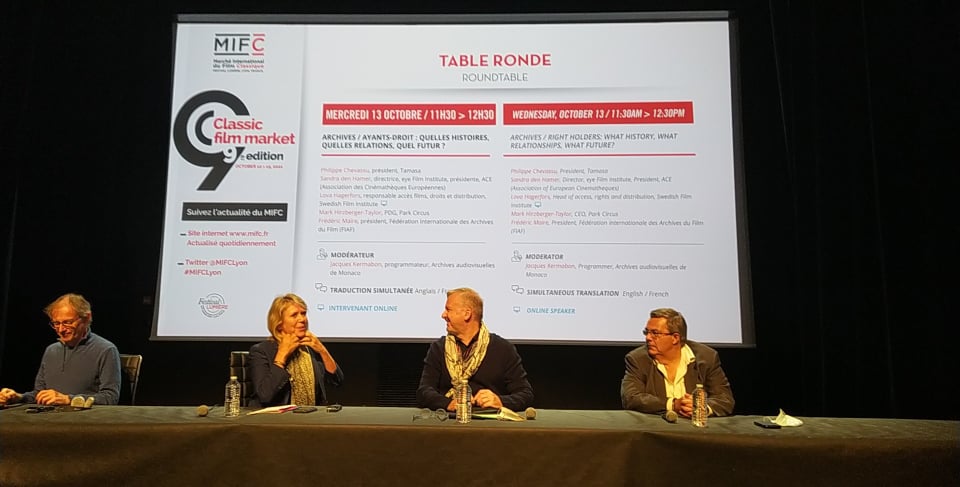Roundtable : Archives / right holders : what history, what relationships, what future?
The theme of the meeting was "What history, what relationships, what future?" and was attended by film Cinematheque directors, distributors and professionals responsible for archives.

Wednesday, October 13, at Le Karbone. During the 9th edition of the Classic Film Market, organized as part of the Festival Lumière, professionals from archives and heads of European cinematheques gathered to discuss the thorny issue of the distribution of heritage films and rights holders. Philippe Chevassu, president of Tamasa, Sandra den Hamer, director of Eye Film Institute and president of ACE (Association of European Cinematheques), Lova Hagerfors, head of access, rights and distribution at the Swedish Film Institute, Mark Hirzberger-Taylor, CEO of Park Circus, and Frédéric Maire, president of the Fédération internationale des Archives du Film (FIAF) were present at this round table. The discussion was moderated by Jacques Kermabon, programmer of the Audiovisual Archives of Monaco.
At the beginning of the conversation, the six professionals came to the same conclusion: heritage cinema cannot exist and perpetuate itself without a good understanding and cordial relationships between film archives and film rights holders. "The hope for heritage cinema is to find ways to work together," explains Frédéric Maire. "We all have the same goal here: to find films, restore them and then show them to the public. We need to arrive at a legislative framework according to the different countries but also the different cinematheques." Indeed, the legislation concerning the rights holders of a cinematographic work, Heritage or not, differs from country to country. Sandra den Hamer, president of ACE, supports Frédéric Maire's comments by demonstrating that, for her, defending heritage cinema means above all belonging to a "Movement". It means a mission to present a classical movie, in physical format in theaters or in a digital format on streaming platforms, so that young audiences can discover Heritage cinema. It is a question of passing from one generation to another, an important legacy for these professionals so that the classical films can continue to exist and also bring to light unknown or forgotten feature films. Furthermore, according to the ACE president, it is « essential for cinematheques to work hand in hand, to create a network to help each other and to work with the rights holders" in order to go in the same direction. That of a protection and a diffusion of the heritage cinema. "The 2020 pandemic has challenged our work and changed the world of film viewing," details Mark Hirzberg-Taylor, CEO of Park Films. "We need to help audiences to go back to theaters, which is also what cinematheque do, but we have to find the perfect business plan."
For Philippe Chevassu, president of Tamasa, the problem of heritage cinema is too often reduced to its distribution. The stakes differ according to the size of the structures but, according to him, it is also a question of will to find an agreement that would allow everyone to take benefits of it (cinematheques, distributors, rights holders). According to him, it is necessary to “show more films, to make more projections". In fact, it is necessary to encourage the screening of heritage films and not only in the framework of retrospectives or special events. Philippe Chevassu continues: "Our vocation is above all that the films be seen. And to give a taste for cinema. Many films could not exist today if the cinematheques did not recover the rights.” For him, this is a crucial and essential partnership. Lova Hargerfors of the Swedish Film Institute, present at the round table via the Zoom app, explained that heritage cinema is fully funded by the government in Sweden. For her, the balance between the distribution of films and their rights holders has been good "so far". Philippe Chevassu concluded this round table by contextualizing the work of cinematheques and distributors, in particular the editorialization around the films which is important for the audience: "One should not believe that we pick films at random from a catalog. As a distributor, we think beforehand, we find a coherent editorial line in order to broadcast a film in the best conditions. We really have to avoid falling into simple automatism like on any other platform. There are not only platforms as a solution. Video editing is part of it." All the professionals present agreed on the importance of this editorial work around the accompaniment of films but also the importance of definitively finding a common ground between cinematheques and rights holders that would facilitate the sustainability and existence of heritage cinema in the future.




